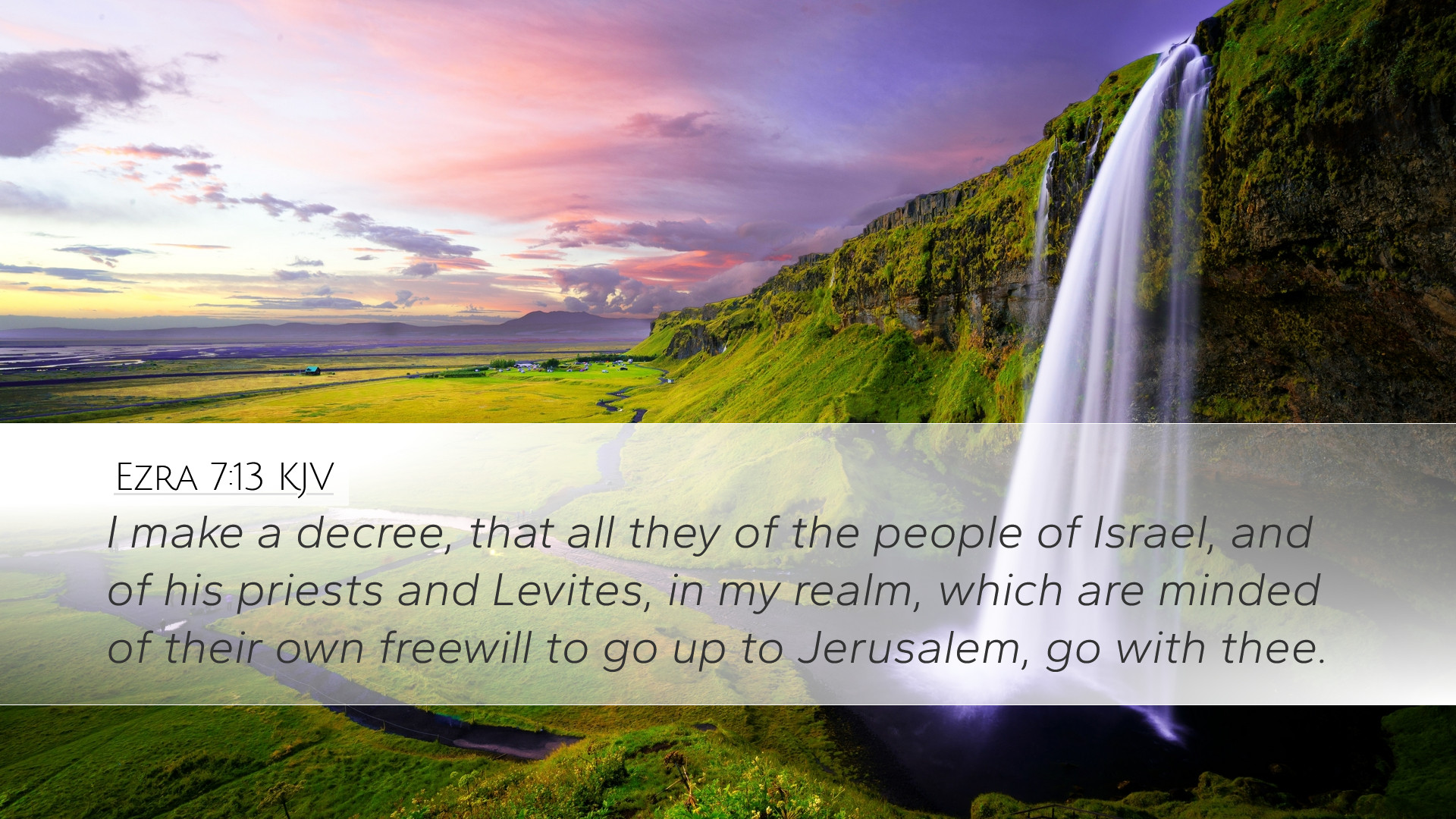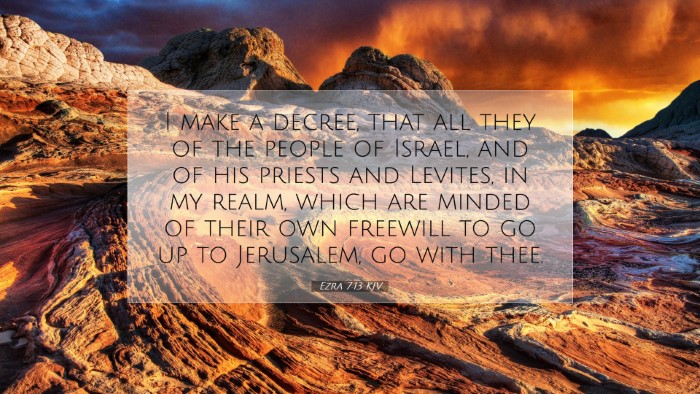Old Testament
Genesis Exodus Leviticus Numbers Deuteronomy Joshua Judges Ruth 1 Samuel 2 Samuel 1 Kings 2 Kings 1 Chronicles 2 Chronicles Ezra Nehemiah Esther Job Psalms Proverbs Ecclesiastes Song of Solomon Isaiah Jeremiah Lamentations Ezekiel Daniel Hosea Joel Amos Obadiah Jonah Micah Nahum Habakkuk Zephaniah Haggai Zechariah MalachiEzra 7:13
Ezra 7:13 KJV
I make a decree, that all they of the people of Israel, and of his priests and Levites, in my realm, which are minded of their own freewill to go up to Jerusalem, go with thee.
Ezra 7:13 Bible Commentary
Commentary on Ezra 7:13
Verse Context: Ezra 7:13 reads, "I issue a decree that all those of the people of Israel and the priests and Levites in my realm who volunteer to go up to Jerusalem may go with you." This verse occurs in the context of King Artaxerxes' declaration, permitting Ezra and other Israelites to return to Jerusalem for the purpose of re-establishing the Law of God among the returned exiles.
Historical Context
Matthew Henry notes that this decree signified a pivotal moment for the Israelites who had been in exile. The return to Jerusalem was not merely a physical journey but a spiritual restoration of a people who had experienced dislocation and cultural dilution.
Albert Barnes emphasizes the significance of Ezra as a leader. He was not only a scribe of the law but also a religious authority whose mission was to teach the law and restore proper worship, establishing accountability among the people.
Exegesis of Ezra 7:13
Adam Clarke highlights the inclusive nature of Artaxerxes' decree. By specifying "all those of the people of Israel," it indicates a recognition of diverse groups within the Jewish population, shedding light on the unity of purpose among the returnees.
The call for volunteers suggests that spiritual response cannot be coerced. As Clarke points out, true worship and service arise from genuine conviction, making the volunteer aspect essential for the restoration process.
Theological Insights
- God’s Sovereignty: This decree illustrates God’s sovereignty in moving the hearts of kings (see Proverbs 21:1). The divine orchestration behind the political landscape demonstrates how God works through unexpected circumstances and authorities for His purposes.
- Voluntary Service: The emphasis on voluntary response underscores the importance of willingness in fulfilling God's mission. The involvement of the laity in ministry highlights the priesthood of all believers.
- Restoration and Renewal: Ezra’s journey symbolizes spiritual renewal. The physical return to Jerusalem is an outward manifestation of an inward transformation, representing the restoration of worship and obedience to God’s commandments.
Spiritual Applications
For modern congregations, this verse challenges believers to consider their own responsiveness to God's call. Are we willing to "go up" and fulfill the mission God has set before us? The voluntary aspect of joining Ezra signifies that participation in God’s work should stem from joy and eagerness, not obligation.
Pastoral Reflections
Matthew Henry reflects on the pastoral responsibility to guide congregations in understanding God's willingness to work through His people. This requires pastors to encourage and empower individuals to act in faith, echoing Ezra's example.
Pastors should strive to cultivate an environment where volunteers feel valued and essential to the ministry of the church. The leadership must draw connections between the historical context and today’s ministry challenges, highlighting the ongoing call for restoration in the local church.
Conclusion
In contemplating Ezra 7:13, we see powerful themes of leadership, unity, and the transformative power of voluntary service to God. As reflected in the insights of Henry, Barnes, and Clarke, Ezra’s mission provides a model for contemporary believers who seek to respond to God’s call in a world that often resembles the exilic experience of Israel.


